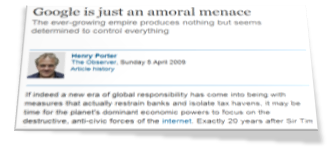Henry Porter attacks Google, on the grounds that Google is an “amoral menace” that threatens “the livelihood of individuals and the future of commercial institutions important to the community”. And by that he means those group of people and companies so essential so the functioning of society, so important a private enterprise as to be equated to government – the Fourth Estate. Newspapers, in short.
Mr. Porter paints Google with the same brush Marxists paint capitalists; as amoral, brutal, and exploitative. Indeed, the language is similar; Google presents those poor newspapers and journalists as a company with which “you comply with its terms or feel the weight of its boot on your windpipe”. And that boot is, according to Mr. Porter, very heavy indeed: newspapers are forced, by those evil laws of competition so essential to capitalism, to publish their material online with only advertising to cover costs. Google is also “in the final analysis a parasite that creates nothing, merely offering little aggregation, lists and the ordering of information generated by people who have invested their capital, skill and time”. Ignoring Mr. Porter’s no doubt unintentional use of the phrase “the final analysis” as opposed to the more accurate “my final analysis”, the depiction of Google as a parasite that feeds off of productive labor is eerily similar to the charge Karl Marx leveled at capitalists.
But moving on from the similarity in the rhetoric between Porter and Marx – there’s a few more choice quotes in there, as well – Mr. Porter makes two errors.
First of all, he claims that the services which Google provides are unproductive; is worth nothing. This is an interesting claim, because what Google does today is very similar to what newspapers were created to do. Newspapers are single firms which “aggregate” a vertical content – namely, news – together and then publish and distribute it to people, making news easy to find. And newspapers make the bulk of the money off of advertising. This is, quite frankly, very similar to what Google does (with regard to news – it does a whole lot more, too). Google aggregate news content, makes it easy to find, and makes money off of advertising. In essence, if newspapers did four jobs, Google “takes over” two of the four, and pushes in on the fourth. The problem is that Google does the “aggregation” of news better (because it can take from multiple sources), takes over distribution, and muscles in on advertising revenue.
The other way to look at this is that Google interjects itself as a middleman between the consumer and the newspaper, and demands a cut for being the middleman. It has this power because Google is a popular consumer destination – or, it has access to the customers. Because Google is a middleman, it takes a share of the advertising revenue. And since the way in which Google operates as a middleman is to aggregate related content, newspapers no longer own the role of the aggregator.
However, Google’s service is worth something. I will leave this as more or less a tautology: Google makes money because Google makes money. There is very little friction online, and low barriers to entry. Google has carved out a market position because it provides a valuable service to consumers; if it didn’t, Google (News) would not be threatening the newspaper industry. People would visit newspaper sites directly. There are other arguments for this, but a neoclassical explanation seems sufficient.
Second, Mr. Porter accuses Google of making money off of the “back of the labour of others”. This is absurd.
One imagines that Mr. Porter has come to the conclusion that the newspapers, and the content they produce, is necessary for Google to sell advertising – that is, to operate as a middleman. However, he neglects to see that while it’s necessary, it is by no means sufficient. For Google to make money, it has to effectively connect consumers to the content they want – that is, it has to provide a valuable service to consumers. Google does not present the newspaper’s content on its own sites, robbing the newspapers of advertising revenue, etc. Instead, Google makes money off of its own labor – that is, the labor required to create and maintain a service which effectively and valuably allows consumers to find the news they want.
In “the final analysis”, to borrow Mr. Porter’s term, it seems as if Mr. Porter wants to divide the world into two groups: people who create content, and people who consume content. Companies like Google, who do not create content, provide nothing valuable and should make no money. While I do not particularly like middlemen myself, I believe that Google is doing more – it is providing search, aggregation, categorization, and other services which people find valuable. Indeed, there are also other solutions (search engines, specialized news sites) who offer similar services – so one cannot even claim that Google has a monopoly, except by default (or a natural monopoly – but that’s a much longer discussion).
I believe that Mr. Porter, and others, should look elsewhere to pin blame for the current malaise of the newspaper industry. As I pointed out in the previous post, there are other explanations for that malaise. And, if you buy into R. Coase’s theory on the Nature of the Firm, then it’s very likely that newspapers are no longer sustainable with their classic business model – the cost of collaboration in the marketplace has dropped to (or below) the cost of collaboration within the newspaper.
Post Revisions:
There are no revisions for this post.
